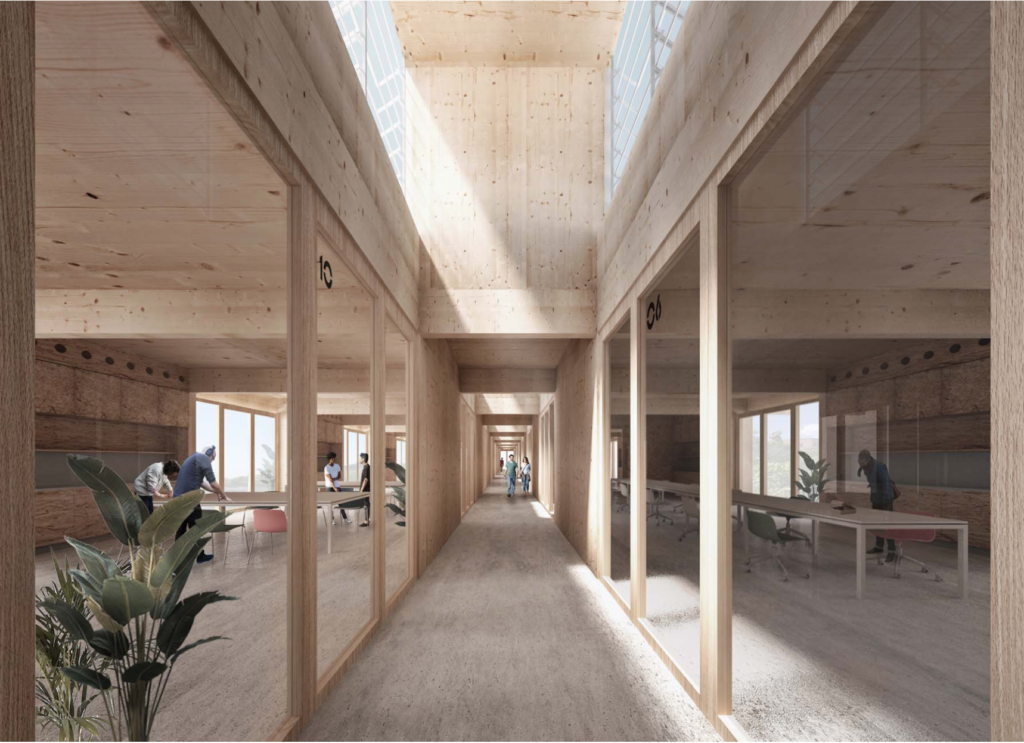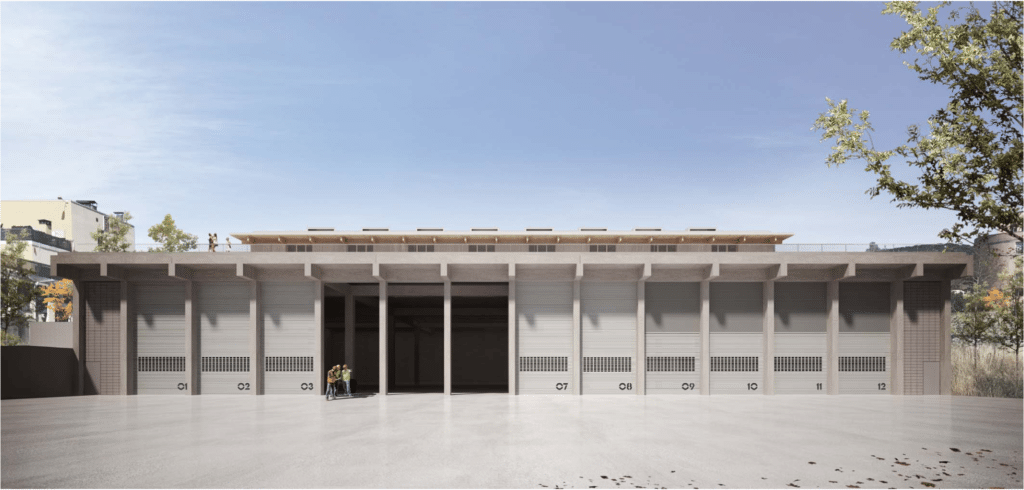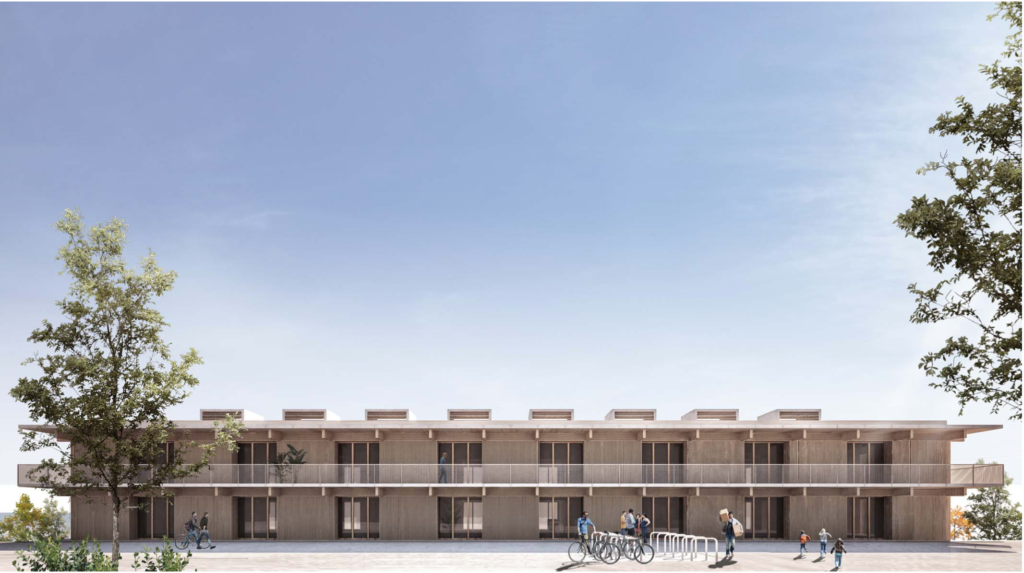The project, unique and disruptive, aims to prevent, repair and reuse waste to extend the life cycle of products and minimize waste generation and the extraction of non-renewable resources
The building’s design is committed to sustainability, integrating recovered building materials, renewable energies and a pedagogical architectural model
With an investment of 40 million euros, the project will create almost 600 jobs and will position the Mata-Rocafonda industrial park as the epicentre of the circular economy.
This week the company Vialser Edificación y Obra Civil, S.L.U. began construction work on the first phase of the Mataró-Maresme Circular Park, located in the Mata-Rocafonda industrial estate in Mataró. Promoted by Maresme Circular, this is a pioneering project in Europe that aims to promote the repair and reuse of materials and products to reduce waste production. It also incorporates, both in design and construction techniques, the highest standards of sustainability that the project itself promotes in terms of circular economy.
With a construction budget of almost 7M€, the first phase of the project includes the ‘Remake Area‘, a “civic centre” for waste prevention with a set of free services for citizens, and which has with a clear vocation for social integration.

Rendering of the interior of the ‘Remake Area’, a “civic centre” for waste prevention with a set of free services for citizens / Maresme Circular
What will the ‘Remake Area’ offer?
– Advice service for self-repair in different areas (computers and electronic devices, carpentry and furniture, bicycles, textiles, domestic DIY, etc.).
– A Library of Things from which to borrow sporadically used objects, such as a drill, which is used for an average of 12 minutes in a lifetime.
– A kitchen where workshops will be held to prevent food waste.
– A reusable tableware lending service.
– A large second-hand store.
– A Scrap Store, where several companies will offer their surplus to research in eco-design.
– Talks to learn how to throw away less and make better use of what we already have.
The implementation of the first phase also includes a bulky waste treatment area connected to door-to-door collection to maximize its recovery potential. Subsequent phases of the Park will focus on more technological and industrial activities of a private initiative.
Sustainable construction
The design of the building, by Julià Arquiteces Associats (JAAS), is intended to follow the European nZEB (Nearly Zero Energy Building) guidelines for energy efficiency in buildings, with near-zero energy consumption. In other words, the building is designed to have a high level of energy efficiency, incorporating passive control solutions to reduce energy consumption over the life of the equipment, and integrating photovoltaic panels on the roof to produce electricity and solar thermal energy to cover its low energy demand.
The design of the building also addresses other key sustainability issues such as the control of its water cycle, the constructive design prioritizing the reduction of the consumption of material and its strategic selection.
At the architectural level, the proposal aims to standardize the presence of materials and elements used and recovered in its construction. For example, taking into account that the project will be carried out on the former land occupied by the Mataró Glassworks Workers’ Cooperative, use will be made of shattered glass fragments of various colours that accumulated on the plot as waste from the old factory for the colouring of the interior flooring.
On the other hand, the project also proposes a strategy of uninhibited visibility of the different structural and constructive systems, with the clear intention of communicating to users and visitors how they work. This is a pedagogical strategy that seeks to explain to society the values of the facility itself as an example of the role that a circular building can play at a social and environmental level, in a context of climate crisis.

Rendering of the bulky waste treatment area of the Mataró-Maresme Circular Park/ Maresme Circular
The headquarters, the Mata-Rocafonda industrial park
What makes the project disruptive is to unify in the same ecosystem initiatives aimed at citizens with private initiatives aimed at implementing business activities in the field of circular economy.
The Mataró-Maresme Circular Park will generate synergies with the urban improvement and development policies of the adjoining neighbourhoods and will energize the Mata-Rocafonda industrial estate as a pole of attraction for circular industries and initiatives. It will also generate new and better employment, economic and social resilience, territorial impact and tractor effect, with scalable and replicable experiences. The project will have a very positive socioeconomic impact for Mataró and the Maresme region. It is estimated that 381 jobs will be generated during the construction phase and another 211 during the operation phase, 105 of which for people at risk of social exclusion.
It is a project aligned with the European Green Pact and the Spanish Circular Economy Strategy and represents an innovative transition towards a new production and consumption model that acts as a lever for industrial modernization, the generation of knowledge and the development of new urban models. The Mataró-Maresme Circular Park is committed to Industry 4.0, the knowledge economy and digitalization.
Investment and schedule
The project, promoted by the Maresme Waste Consortium, an entity formed by 28 town councils of the region under the presidency of Mataró, and also with the participation of the Barcelona Provincial Council and the Regional Council of Maresme, has an estimated investment of almost 40M€ which comes from the Maresme Consortium City Councils (14.3M€), private investment (14.6M€) and subsidies from the Catalan Government and Next Generation funds (11M€).
The start of work on the first phase is four years behind schedule. This is due to the discovery of archaeological remains from Roman, late Roman and medieval times during the removal of the industrial preconstructions and initial archaeological survey carried out at the end of 2020 on the site where the Circular Park will be located. The Department of Culture of the Catalan Government has given authorization for the findings to be transferred to the Bon Recés area, 250 metre from the original site, so that the Mataró City Council can display them in a future interpretation centre. Until that time comes, they will be provisionally stored in the plot of the Park.
The delay in the start of the works could mean that the subsidies obtained for the project (valued at around 11M€ and subject to strict deadlines) cannot be executed. In this case, the Consortium will look for other ways to make the project sustainable.
The construction of the first phase is expected to be completed by the spring of 2026.

The Mataró-Maresme Circular Park is a pioneering project in Europe that aims to promote the repair and reuse of materials and products in order to reduce waste production / Maresme Circular




